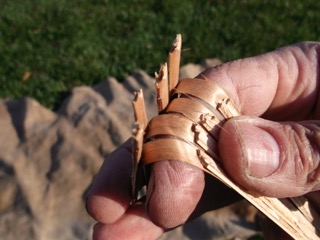Hunting Dogbane in Late Fall
- Jeff Gottlieb
- Dec 21, 2018
- 1 min read
Each year, once the annual plant stalks die, I go hunting for an important resource. I use a lot of dogbane (Apocynum cannabinum) for cordage making. The bast fibers in the inner bark of the stalk are strong, fine and a beautiful red-brown color. The plant is toxic while fresh so I wait till the stalks are completely dead and dry to harvest it.

Dogbane likes to grow in sunny, disturbed places such as roadsides and abandoned farm fields. This makes it hard to rely on since the disturbance is likely to happen again before I can go and harvest the few hundred stalks I want for a year's cordage making and workshop supply. Someone with rights to the property could come back and mow or plow all of the dogbane down!
I love the seasonality of collecting dogbane: I get it in the very late Fall or early Winter, when I am done working so busily, and I will have time to plan, make crafts and projects, and get ready for the Spring season of educational Gatherings, school classes and workshops. It is ready for me to collect when I am ready to go collect it!

I cut the stalks carefully instead of pulling them. I want the roots to stay healthy and uninjured so that they will sprout new stalks in the Spring. If all goes well, I will come back next year and do it all again.







AGM Global Vision's thermal clip-on systems https://www.agmglobalvision.com/thermal-imaging/thermal-clip-on-systems sound incredibly advanced and practical. The ability to detect even slight temperature differences is impressive, and the fact that they can be easily mounted without rezeroing is a huge plus. The option for automatic or manual calibration, along with features like electronic accuracy correction, shows a real attention to detail. It's also great to see a three-year warranty included, which adds confidence in the product's durability. These systems seem like a fantastic addition to any setup, making it easy to transition from day to night vision seamlessly.
Good of you to write this from a gathering point of view. Capt. M. Lewis called Indian Hemp silk grass due to the glossy show it has when the pith is broken out. You show that detail well here. Just ran into a colony along the roadside here in Whitehall, Montana that had been indirectly hit with herbicide. The fibers were as weak as with plants that were over a year old standing in the field. I do see Indian hemp now in nearly every interstate highway drainage across the US & Canada. Seems to be actively used to prevent erosion.